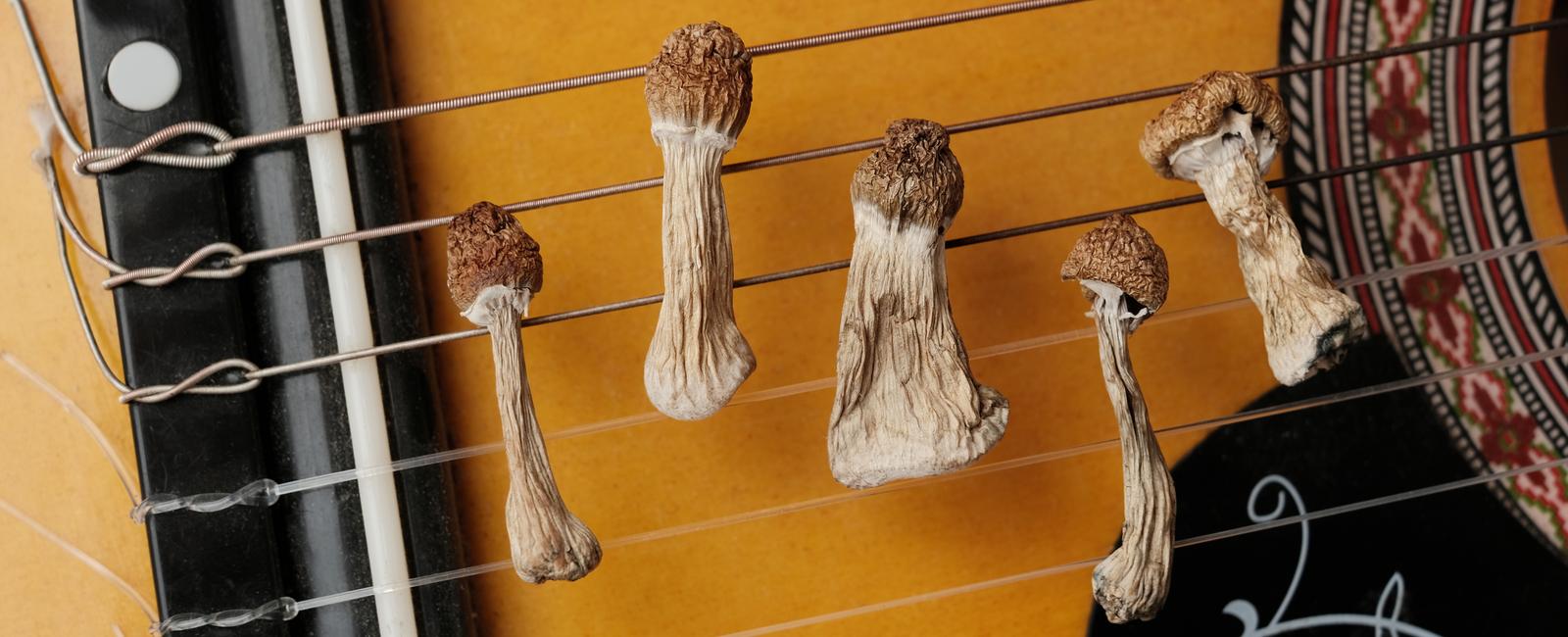

Whether inexperienced with mushrooms or counting down the days until your next trip, most would agree that psychedelic experiences, like most things, are best accompanied by music.
For some, memories of the psilocybin scene begin with psychedelic rock legends like Jimi Hendrix, whose electric guitar provides both the song and the show, eliciting euphoric chords and an equally thrilling response from within.
Withstanding the test of time are rockstars like Tom Petty and The Rolling Stones, who are consistently mentioned by those sharing playlists made for experiencing psychedelics. Today, hundreds of thousands of people travel to music festivals yearly to take a trip down the rabbit hole with their favorite artists, live, unfiltered, and uninhibited.
While the consensus that music takes mushrooms and other psychedelics to the next level still stands, many assume that the relationship between the two stops at specific genres.
Country music artist Margo Price says and does otherwise.
Margo Price breaks the mold
In her interview with Billboard, Margo Price shares details of her long-term relationship with psilocybin, country music, and, in her words, “doing country s—t.”
The songwriter, 39, first tried magic mushrooms as a sophomore in college and said the trip changed her worldview, goals, and direction. Price even attributes her decision and dedication to becoming a full-time musician to the shrooms, saying they “connect neural pathways in your brain,” allowing for transformative growth and change.
If eating mushrooms and deciding to drop out of college already sounds unbelievable, Price’s most recent psych-inspired revelation will undoubtedly shock you.
Research shows that magic mushrooms might be the next breakthrough in addiction and substance abuse therapy, and Margo Price stands testimony. After a psilocybin trip in January 2021, the country star, struggling with alcohol, decided to cut out the vice completely.
Price says after the trip, she felt “like a curse was lifted,” and her ability to abstain from both alcohol and cigarettes became second nature. From there, she dove head-first into psychedelic research. She began exploring how alcohol and addiction are often glamorized in country music.
Breaking free of her addiction, Price began pouring her newfound passion and self-actualization into her music, as well as into her 2022 memoir, Maybe We’ll Make It. The slightly off-kilter yet optimistic self-reflection pores into her experience with life, mushrooms, and country music and precedes her 2023 album, Strays, like an introductory predecessor, screaming to audiences, “READ ME FIRST.”
Throughout her new album, the previously dubbed Americana-Country music star breaks through metaphysical chains within her music and her mind. Following her self-proclaimed “mind vacations” during the pandemic, Price bursts forward with a sound only described as a sonic oxymoron: psychedelic country.
Alongside psych-influenced synths, vocals, and other production elements flittering about Strays, come introspective, personal proclamations of weakness, learning, success, and understanding. Margo Price has not only allowed her sound to become influenced by psychedelia, but her worldview and lyrical perspective, allowing her to take on different identities throughout the new album, peeking behind the curtain of the human condition and delivering the same psychedelic whirlwind she experienced.
While Price acknowledges her position as a labeled country artist, her momentum remains unchanged.
Price told Billboard, “I’m trying to break that, shatter that expectation — but I will make country albums again. I just covered a Billy Joe Shaver song, ‘Ragged Old Truck.’ I’m still doing country s–t.”
Psychedelic country in past and present
Though Price’s profile recently sparked the conversation about the relationship between psychedelics, like LSD and mushrooms, and country music, their connection dates far beyond the country singer.
Since country music’s rise in popularity in the past century and the takeoff in psychedelic research in the 1960s, one name seemingly unites the unlikely duo: Willie Nelson.
The country legend’s experience with LSD in the ‘70s is documented in his 2015 memoir, It’s a Long Story: My Life, in which he details taking three times the average dose, performing through a bad trip, and consequently cementing his relationship with cannabis.
“My love affair with pot became a long-term marriage,” said Nelson.
While that isn’t the thrilling drug story you may expect, the transformative powers of psychedelics are unpredictable and different for everyone. However, Willie Nelson proved that alcohol and tobacco weren’t the only drugs that country music could touch.
This decades-spanning precedent began to take root in country songs and artists throughout the years, eventually blossoming into the colorful synth-hybrid of country’s sweetest vocals and psychedelia’s best auditory and lyrical influences.
Multi-time Grammy award-winning country music star Kacey Musgraves has made her experimentation no secret, even citing “life-changing” psychedelic therapy as a turning point in writing her 2021 album, Star-Crossed.
Musgraves told Rolling Stone more about her guided trip, saying, “It was not recreational at all,” and instead compared it to experiencing a decade of intensive therapy. The country star also included her position as an individual, not an advocate for fans.
“I just know what kind of works with me, and I would never push anyone to do anything that they’re not comfortable with,” said Musgraves.
The psychedelic groove continues
While psychedelic groove exists across country music, the most prominently affected artist has gone as far as to experiment with and recount memories of DMT on tracks.
Sturgill Simpson may very well be a household name for anyone who’s a regular shroombody, but for those who neglected country music for so long out of bias (myself included, admittedly), please do yourself a favor and join the ride.
Likely the most widely recognized for and musically aligned with country psychedelia, Simpson’s affinity for hallucinogens has permeated every crevice of his music.
With lyrics like “There’s a gateway in our mind that leads somewhere out there beyond this plane/Where reptile aliens made of light cut you open and pull out all your pain,” it’s evident the psychedelic cowboy is undoubtedly expressing his familiarity with DMT, a drug known for relatively intense hallucinations.
Simpson, however, insists the track and most of his music are about love and other motifs and that the psychedelic influences were naturally occurring forces that the country music star, 44, observed in the world.
Says Simpson, “I wasn’t really saying, ‘Hey everybody! Go out and eat 10 grams of mushrooms and you’ll understand life.”
And neither are we. Throughout country music history, artists have expressed discontent with the expectations and pressures of the cowboy culture. Throughout struggles with alcohol, tobacco, and other substances, many emerging psychedelic artists are finding themselves in a similar position.
Despite the modern wave of mushrooms opening minds globally, the stigma around psychedelics hasn’t disappeared- it’s only changed into something new. When artists outside genres typically associated with psychedelia, like indie, hip-hop, and EDM, share their experiences with hallucinogens, a magnifying glass of expectation is placed upon them. Fans expect to hear a transformed country sound that interweaves elements of psych-flavor throughout an album, and regardless of the outcome, overanalyze, just as Simpson warns against.
Just sit back and enjoy.


